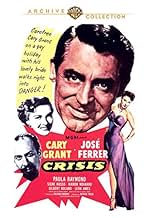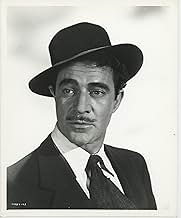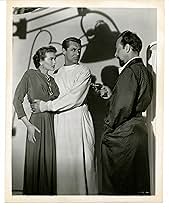PUNTUACIÓN EN IMDb
6,7/10
2 mil
TU PUNTUACIÓN
Añade un argumento en tu idiomaWhile on vacation in a Latin American country, an American neurosurgeon and his wife become tangled in a revolutionary uprising against a tyrannical dictator.While on vacation in a Latin American country, an American neurosurgeon and his wife become tangled in a revolutionary uprising against a tyrannical dictator.While on vacation in a Latin American country, an American neurosurgeon and his wife become tangled in a revolutionary uprising against a tyrannical dictator.
- Dirección
- Guión
- Reparto principal
- Premios
- 1 premio en total
José Ferrer
- Raoul Farrago
- (as Jose Ferrer)
Lillian Adams
- Nurse
- (sin acreditar)
Carlos Barbe
- Friend of Farrago
- (sin acreditar)
Orlando Beltran
- Doctor's Assistant
- (sin acreditar)
Audrey Betz
- Servant
- (sin acreditar)
George Brady
- Student
- (sin acreditar)
Robert Cabal
- Very Young Man
- (sin acreditar)
Andy Carillo
- Man at Table
- (sin acreditar)
Bridget Carr
- Guest
- (sin acreditar)
Teresa Celli
- Rosa Aldana
- (sin acreditar)
Carlos Conde
- Man
- (sin acreditar)
Rita Conde
- Pretty Woman
- (sin acreditar)
Reseñas destacadas
Crisis represents yet another attempt by Cary Grant to break away from his light leading man image and do something with more drama. His last attempt was None But the Lonely Heart which got great critical notices, an Oscar nomination for him and died at the box office. The public just didn't want to see him in stuff like Crisis.
The film is one of a very few non-musical productions by Arthur Freed at MGM. And the original story was intended for Spencer Tracy who was to be a neurosurgeon traveling in Latin America with a 10 year old daughter. The powers that be decided a little romance was needed so Tracy was substituted by Grant and he was given a wife played by Paula Raymond instead of a daughter.
He's a neurosurgeon and when the powers that be discover him in their country he's brought to the presidential palace to operate on Peron like dictator Jose Ferrer. Then the rebels capture Paula Raymond and Grant's got a dilemma.
Signe Hasso who was cast in the role of the first lady bears more than a passing resemblance to Eva Peron does the best job in the film. Cast in Latino parts are such Hollywood Latinos as Raymond Novarro, Gilbert Roland, Antonio Moreno, and Pedro deCordoba. All perform well.
Crisis marked Richard Brooks's directorial debut and he wrote the script as well. Unfortunately the same thing happened here as did to None But the Lonely Heart. Great reviews and it lost money. Brooks was established as a director though.
The film is one of a very few non-musical productions by Arthur Freed at MGM. And the original story was intended for Spencer Tracy who was to be a neurosurgeon traveling in Latin America with a 10 year old daughter. The powers that be decided a little romance was needed so Tracy was substituted by Grant and he was given a wife played by Paula Raymond instead of a daughter.
He's a neurosurgeon and when the powers that be discover him in their country he's brought to the presidential palace to operate on Peron like dictator Jose Ferrer. Then the rebels capture Paula Raymond and Grant's got a dilemma.
Signe Hasso who was cast in the role of the first lady bears more than a passing resemblance to Eva Peron does the best job in the film. Cast in Latino parts are such Hollywood Latinos as Raymond Novarro, Gilbert Roland, Antonio Moreno, and Pedro deCordoba. All perform well.
Crisis marked Richard Brooks's directorial debut and he wrote the script as well. Unfortunately the same thing happened here as did to None But the Lonely Heart. Great reviews and it lost money. Brooks was established as a director though.
Fans of Cary Grant should see this under appreciated film. It proves that Grant could indeed act - and that he has far greater range than his standard light comedy fare would indicate.
This is not a great movie, but it is a very well made movie. It has high production values. The film features three of the major "Latin Lovers" from the Silent era - Gilbert Roland, Ramon Novarro, and Pedro De Cordoba.
Jose Ferrer and Signe Hasso play a Latin American Dictator and his wife. They are the weakest points in the production - Ferrer insists on "Acting" through every scene. His performance comes across as very dated and unbelievable. Hasso, normally a fine actress, comes across as wooden and barely lifelike.
The weakest point in the production is the script. It insists on being very "politcal" and this detracts from the enjoyment value. Yet, because of this political viewpoint, it treats Latinos with much more respect and consideration than other movies filmed during this era.
This is not a great movie, but it is a very well made movie. It has high production values. The film features three of the major "Latin Lovers" from the Silent era - Gilbert Roland, Ramon Novarro, and Pedro De Cordoba.
Jose Ferrer and Signe Hasso play a Latin American Dictator and his wife. They are the weakest points in the production - Ferrer insists on "Acting" through every scene. His performance comes across as very dated and unbelievable. Hasso, normally a fine actress, comes across as wooden and barely lifelike.
The weakest point in the production is the script. It insists on being very "politcal" and this detracts from the enjoyment value. Yet, because of this political viewpoint, it treats Latinos with much more respect and consideration than other movies filmed during this era.
Cary Grant is a noted surgeon traveling with his wife (Paula Raymond) in a Latin American country when there's a "Crisis."
This 1950 black and white film also stars Jose Ferrer, Leon Ames, Ramon Novarro, and Gilbert Roland. Grant, as Dr. Ferguson, and his wife are trying to leave the country due to political unrest when they are kidnapped and brought to the home of the country's dictator, Raoul Farrago (Ferrer).
There, they learn from his wife (Signe Hasso) that the leader is dying of a brain tumor, and options for an operation are few as no one wants him to live. Ferguson agrees on certain conditions.
Ultimately, his wife is involved in a riot, and he sends her home. It isn't until the surgery is over that he learns that certain things have been kept from him.
This is actually a very good and underrated film, not the usual Cary Grant type of role or movie, which in itself should have sparked some interest when it was released.
People know the handsome Grant and his debonair persona, his gift for physical comedy and the way he has with a line - but it's nice to remember occasionally that underneath all that star power and tailored suits there's a fine actor.
Here he plays a man who makes a commitment to a patient he plainly doesn't like, and he has to fight to control his emotions. His anger over the situation makes this difficult.
Ferrer is terrific as a violent man who thinks of his people as dumb children as he feathers his own nest with money that rightfully belongs to them. As his Evita-like wife, Signe Hasso has a chance to show her capabilities, and she's excellent - charming on the surface, worried about her husband, and hard as nails underneath.
Hasso was a wonderful Swedish actress often relegated to B movies or to small roles in A films. Eventually she turned to theater and television. Here we see, had the roles been there for her, what a find she truly was.
It's always great to see old-timers Gilbert Roland and Ramon Novarro, the latter as Colonel Dragon, and the former as a revolutionary who wants Grant to kill Farrago on the operating table. Actually he's no better than Farrago, and Ferguson gets a bird's eye look at oppression politics.
A very good film; worth seeing for Grant, Ferrer and Hasso.
This 1950 black and white film also stars Jose Ferrer, Leon Ames, Ramon Novarro, and Gilbert Roland. Grant, as Dr. Ferguson, and his wife are trying to leave the country due to political unrest when they are kidnapped and brought to the home of the country's dictator, Raoul Farrago (Ferrer).
There, they learn from his wife (Signe Hasso) that the leader is dying of a brain tumor, and options for an operation are few as no one wants him to live. Ferguson agrees on certain conditions.
Ultimately, his wife is involved in a riot, and he sends her home. It isn't until the surgery is over that he learns that certain things have been kept from him.
This is actually a very good and underrated film, not the usual Cary Grant type of role or movie, which in itself should have sparked some interest when it was released.
People know the handsome Grant and his debonair persona, his gift for physical comedy and the way he has with a line - but it's nice to remember occasionally that underneath all that star power and tailored suits there's a fine actor.
Here he plays a man who makes a commitment to a patient he plainly doesn't like, and he has to fight to control his emotions. His anger over the situation makes this difficult.
Ferrer is terrific as a violent man who thinks of his people as dumb children as he feathers his own nest with money that rightfully belongs to them. As his Evita-like wife, Signe Hasso has a chance to show her capabilities, and she's excellent - charming on the surface, worried about her husband, and hard as nails underneath.
Hasso was a wonderful Swedish actress often relegated to B movies or to small roles in A films. Eventually she turned to theater and television. Here we see, had the roles been there for her, what a find she truly was.
It's always great to see old-timers Gilbert Roland and Ramon Novarro, the latter as Colonel Dragon, and the former as a revolutionary who wants Grant to kill Farrago on the operating table. Actually he's no better than Farrago, and Ferguson gets a bird's eye look at oppression politics.
A very good film; worth seeing for Grant, Ferrer and Hasso.
"Crisis" is a study in how a strong supporting cast can make a movie complete. While Grant and Ferrer give powerful performances, they are enhanced by even better performances by Signe Hasso and Ramon Navarro. The latter two, with subtle, understated characterizations, round out a thoughtful script and cast. The story is compelling -- medical/ethical conflict, interwoven with a political drama which doesn't attempt to sway. It does provide a backdrop which doesn't interfere but enhances.
Most IMDb critics claim that this is unlike any other Cary Grant role, but I think his performance is remarkably reminiscent of "Notorious." Agent Devlin was more romantic, to be sure, but Dr. Ferguson is also a cool, calm, rational, and duty-bound man in a political maelstrom: he's a surgeon, vacationing in a banana republic whose tumor-stricken dictator shanghais him. The result is a trenchant dramatic character, which Grant does very well, supported by Ramon Novarro and Gilbert Roland, who always add quality to a movie. And I'd single out two other performers:
The Spanish composer Vicente Gómez graces only one scene, in a café, but he plays a soulful guitar solo that I wanted much, much more of.
And then there's José Ferrer as the dictator. He almost steals every scene, especially when he watches Grant's amateur surgical team drill into a fake human skull, rehearsing for the surgery awaiting the dictator himself tomorrow. When the rehearsal is done, Ferrer is sweating visibly and fumbling with a cigarette. He makes it easy for you to project yourself into that makeshift O. R. with the student surgical team-- you with a brain tumor and a captive surgeon who makes no effort to hide his antipathy.
But Grant holds his own. "Tell them never to use that instrument on the brain again," he says to his translator. "It might suck a piece right out of the brain." Ferrer hears, of course, and through his sweat he asks, "How did it go?" Grant drops the stitched-up skull in a garbage pail and says, "Oh, it went quite well. But you died."
The Spanish composer Vicente Gómez graces only one scene, in a café, but he plays a soulful guitar solo that I wanted much, much more of.
And then there's José Ferrer as the dictator. He almost steals every scene, especially when he watches Grant's amateur surgical team drill into a fake human skull, rehearsing for the surgery awaiting the dictator himself tomorrow. When the rehearsal is done, Ferrer is sweating visibly and fumbling with a cigarette. He makes it easy for you to project yourself into that makeshift O. R. with the student surgical team-- you with a brain tumor and a captive surgeon who makes no effort to hide his antipathy.
But Grant holds his own. "Tell them never to use that instrument on the brain again," he says to his translator. "It might suck a piece right out of the brain." Ferrer hears, of course, and through his sweat he asks, "How did it go?" Grant drops the stitched-up skull in a garbage pail and says, "Oh, it went quite well. But you died."
¿Sabías que...?
- CuriosidadesOriginally banned in Mexico, Central and South America.
- PifiasThe doctor announces his fee is ten percent of the patient's income, but does not say whether this means monthly, annual or some other period.
- Citas
Raoul Farrago: At least permit me to thank you. You have done a great service not only to me but to the people of my country.
Dr. Eugene Norland Ferguson: I only saved your life I didn't vote for you.
Raoul Farrago: Neither did they.
[smiling]
- Créditos adicionalesPROLOGUE: "The time is now. The scene of the action is fictitious, but the forces at play in this story are not fictitious."
- Versiones alternativasAlso available in a computer colorized version.
- ConexionesReferenced in Secret Publicity - Forbes Taylor Remembers the Making of State Secret (2021)
Selecciones populares
Inicia sesión para calificar y añadir a tu lista para recibir recomendaciones personalizadas
- How long is Crisis?Con tecnología de Alexa
Detalles
Taquilla
- Presupuesto
- 1.616.455 US$ (estimación)
- Duración1 hora 35 minutos
- Color
- Relación de aspecto
- 1.37 : 1
Contribuir a esta página
Sugerir un cambio o añadir el contenido que falta

Principal laguna de datos
By what name was Crisis (1950) officially released in India in English?
Responde
































